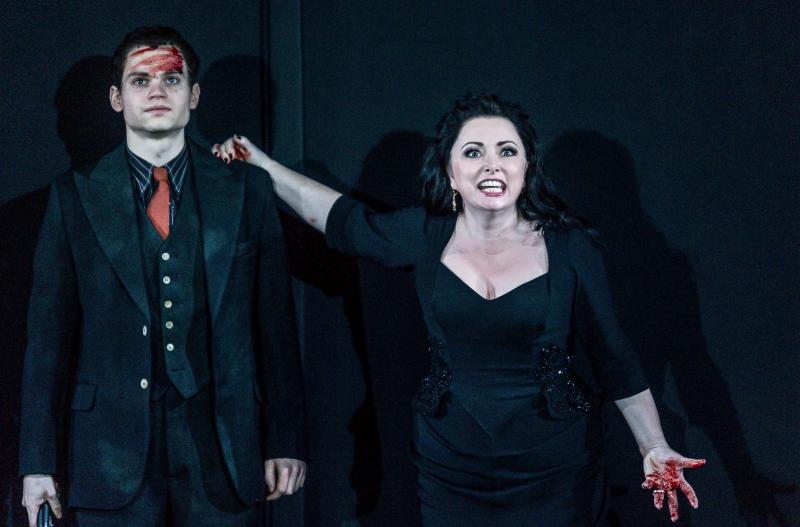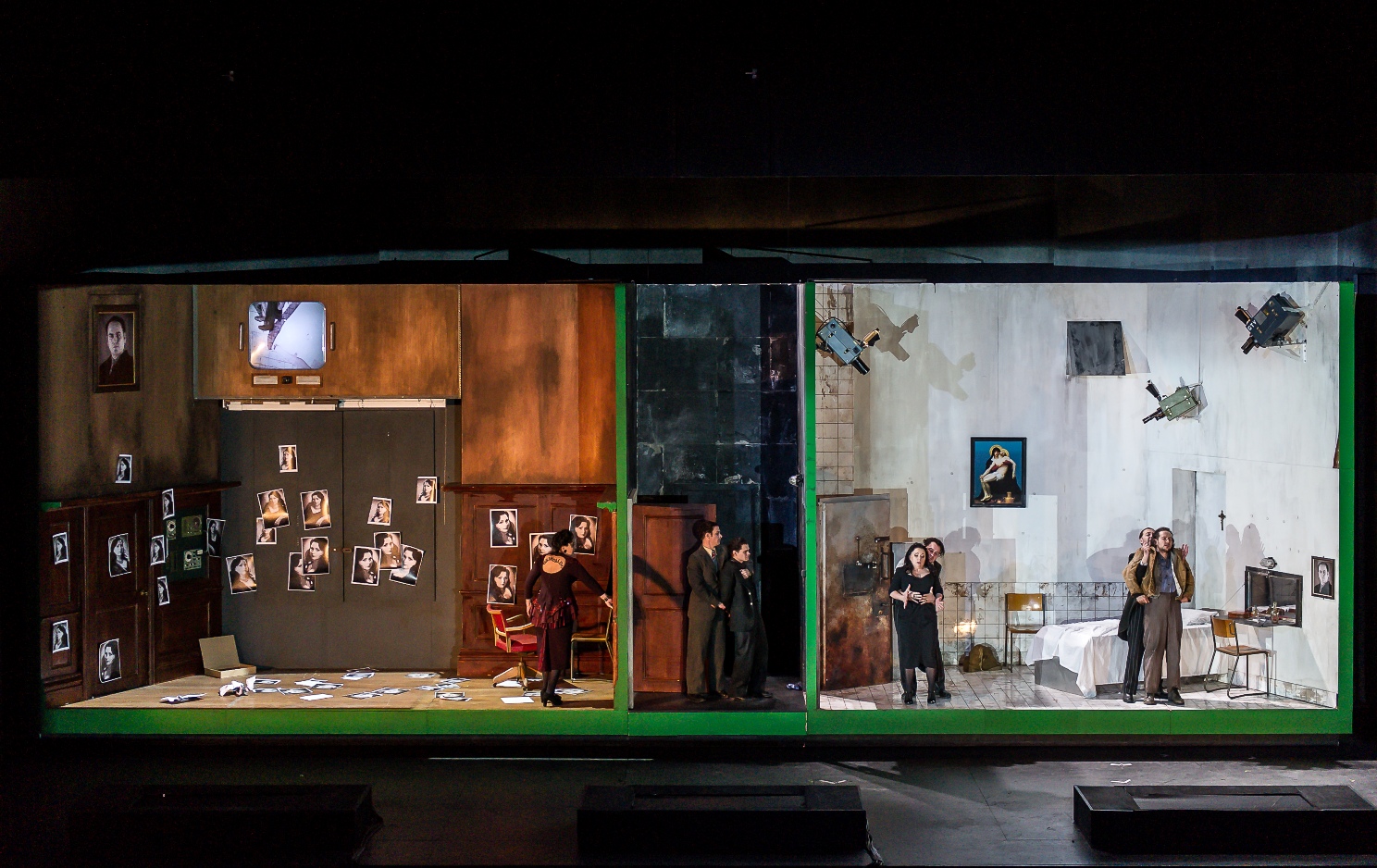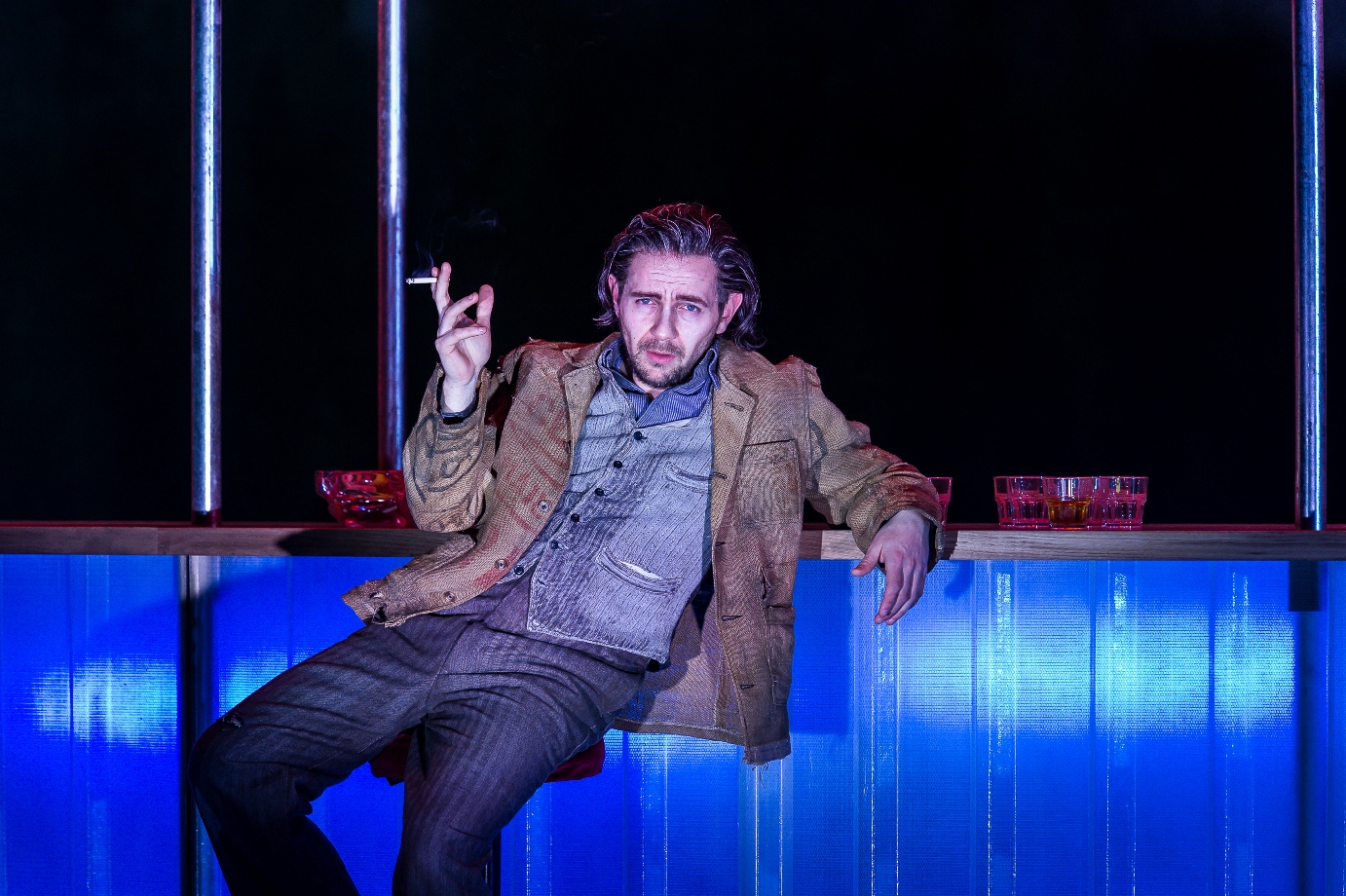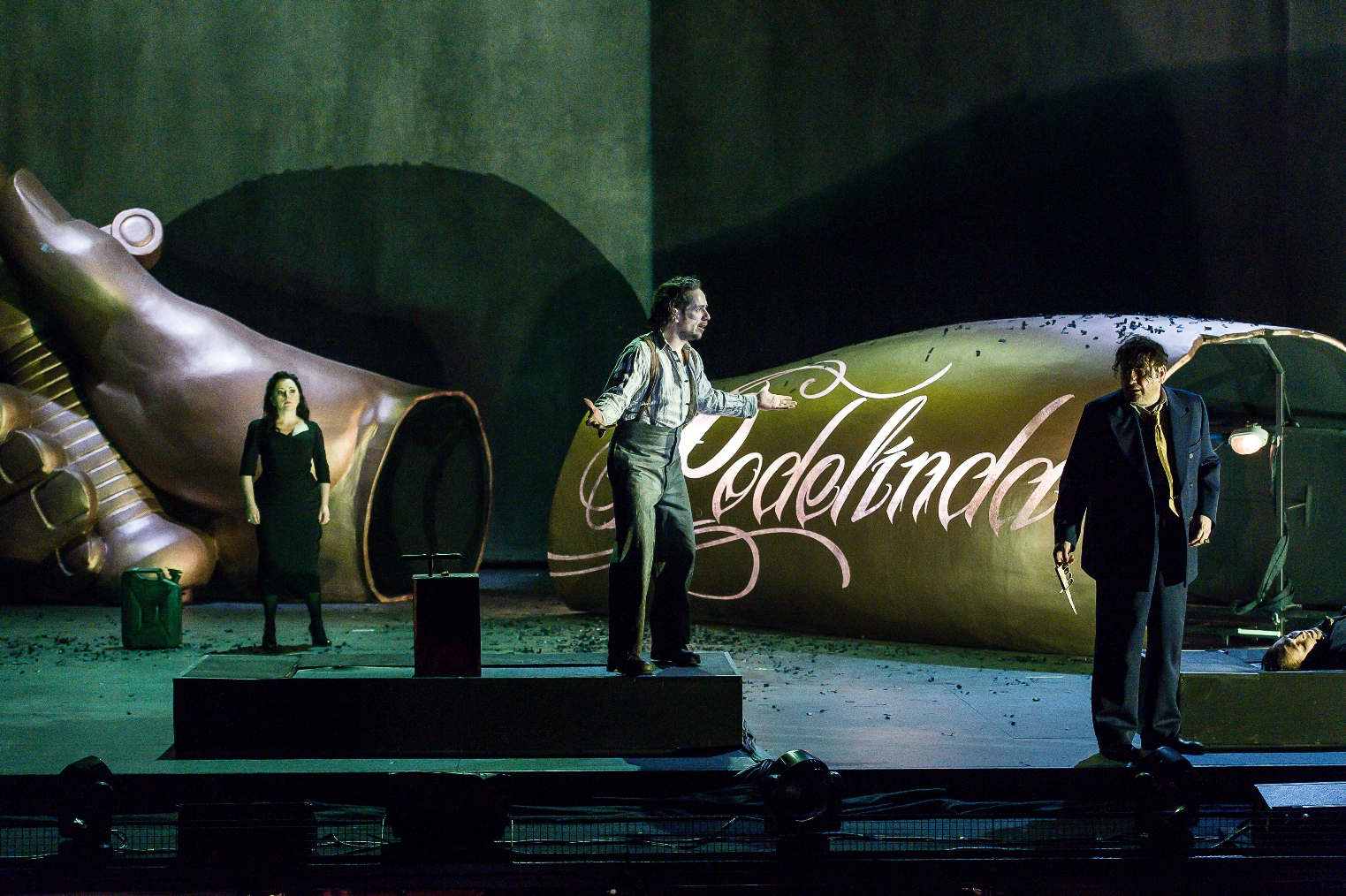Rodelinda, English National Opera | reviews, news & interviews
Rodelinda, English National Opera
Rodelinda, English National Opera
Richard Jones' tragicomic mobster Handel, superbly cast, shows us what opera can do

If they asked me, I could write a book about the way one number in Richard Jones’s ENO production of Handel’s Rodelinda – the only duet, after 18 arias, and nearly two hours into the action – looks, sounds and moves.
Which is, I take it, that at this point, just when two people really (re)connect, they’re torn apart by the unstoppable vendetta of warring clans. For most of the three acts, six of the seven characters locked in internecine combat are on top of each other. It’s supposed to be the Lombards of Milan, but it feels more like the Camorra of Naples, the ‘Ndrangheta of Calabria or the Sicilian Mafia in a surprisingly deft, even elegant portrayal of blingy, raw and often stupid power struggles, with absurd violence lurking round every jokey corner. Try and escape the family, and you’re walking or running on the spot (three treadmills at the front of the stage). In the inescapable mansion, there are two rooms, an impersonal capo headquarters training its cameras on the grubby cell stage left. How does this work in Handel's favour? Well, it means that whenever one voice is dealing with its da capo aria - and there's an awful lot of setting up with standard numbers in Act One, as usual with the composer - there’s help on hand from the relatives to flesh it out, back it up, contradict: a much better solution than random, distracting action going on in the background, as has so often been the tendency in Handel stagings. So the highlighted singer doesn’t always have to do all the business, though we see Evans’ presumed widow Rodelinda flinging usurper Grimoaldo’s jewels around the room and pouring coffee on a proferred stole; later, John Mark Ainsley as the tyrant urged on by his nasty sidekick to dispatch the husband who’s still alive expertly tackles a bravura aria wielding knife, blowtorch and explosives while he still hesitates to kill his victim.
How does this work in Handel's favour? Well, it means that whenever one voice is dealing with its da capo aria - and there's an awful lot of setting up with standard numbers in Act One, as usual with the composer - there’s help on hand from the relatives to flesh it out, back it up, contradict: a much better solution than random, distracting action going on in the background, as has so often been the tendency in Handel stagings. So the highlighted singer doesn’t always have to do all the business, though we see Evans’ presumed widow Rodelinda flinging usurper Grimoaldo’s jewels around the room and pouring coffee on a proferred stole; later, John Mark Ainsley as the tyrant urged on by his nasty sidekick to dispatch the husband who’s still alive expertly tackles a bravura aria wielding knife, blowtorch and explosives while he still hesitates to kill his victim.
 Curnyn sets up a sleek, muscular sound which the classy principals are more than able to emulate, filling the Coliseum with authentic Handelian style and none of the disappearing notes you get with pipsqueak early music singers (I’ve heard too many of those over the past month). Evans, unrecognisable like Ainsley in black wig, the black putative widow to the life, has help from Handel and Amanda Holden’s bold translation from the start but still gives a special kick to Rodelinda's opening “I have lost him”. Here’s a queen of lyric sopranos as lethal matriarch, stunningly abetted by young Matt Casey as her silent but far from passive son Flavio (his mimes of what his mother will do to slimy mafia henchman Garibaldo – Richard Burkhard, a slick operator – when she’s married the master steal the limelight).
Curnyn sets up a sleek, muscular sound which the classy principals are more than able to emulate, filling the Coliseum with authentic Handelian style and none of the disappearing notes you get with pipsqueak early music singers (I’ve heard too many of those over the past month). Evans, unrecognisable like Ainsley in black wig, the black putative widow to the life, has help from Handel and Amanda Holden’s bold translation from the start but still gives a special kick to Rodelinda's opening “I have lost him”. Here’s a queen of lyric sopranos as lethal matriarch, stunningly abetted by young Matt Casey as her silent but far from passive son Flavio (his mimes of what his mother will do to slimy mafia henchman Garibaldo – Richard Burkhard, a slick operator – when she’s married the master steal the limelight).
Ainsley provides wit and even warmth as the inept capo, “Rodelinda” at one point tattooed on his back as well as in his heart, his 1 o'clock pastoral of repentance up there with similar earlier numbers for queen and resurrected victim. And is there a more sheerly beautiful and more musicianly countertenor sound than Iestyn Davies’s, now with added edge and intensity, in Bertarido’s isolated musings? Those have the usual Jones symmetry, adding to the balance of photo-campaigning and weapons of individual destruction: the first is at the foot of Bertarido's fascistic monument in the first act which shatters in the third - Evans, Davies and Ainsley pictured below - while the second is a drink-drowned sorrowful meditation beneath neon gigantism in Act Two's garish bar central, pictured above. Let's also not forget the perfect timing for Steven Williams' two video projections, all the better for their spare use.
 At first it seemed like a cruel ploy to give Davies a sidekick of similar vocal pitch but lesser tonal lustre. Yet Christopher Ainslie’s Unulfo fulfils some terrific physical demands from Jones and eventually hits vocal silver. There's also a touching moment when he reveals his own name-tattoo to match the others. Last but not least, Susan Bickley's opportunistic bitch sister Eduige manages to keep in vocal focus throughout despite tottering around on high heels. Costume designer Nicky Gillibrand must have had fun with the ladies' frocks.
At first it seemed like a cruel ploy to give Davies a sidekick of similar vocal pitch but lesser tonal lustre. Yet Christopher Ainslie’s Unulfo fulfils some terrific physical demands from Jones and eventually hits vocal silver. There's also a touching moment when he reveals his own name-tattoo to match the others. Last but not least, Susan Bickley's opportunistic bitch sister Eduige manages to keep in vocal focus throughout despite tottering around on high heels. Costume designer Nicky Gillibrand must have had fun with the ladies' frocks.
Ultimately, it’s a total team effort, providing image after image you won’t forget. And that duet isn’t the only limelight-holder: see how brilliantly Jones sets up a husband-wife reunion just before it which could have been thrown away in recitative. A first-night audience unusually vocal in its approval for each number was stilled at the end of Rodelinda’s lilting aria: Bertarido throws open her cell door not after, but on, the last chord. Now that’s clever stagecraft. So is one solution to scene-changing which you anticipate drowning out a sensitive repeat. Evans’s last big number, the lament we’ve all been waiting for, moves from quiet heartbreak to mother-son vendetta oath as Curnyn once again swells the bass-rich orchestra to match the soprano’s heroic-dramatic escalation. This, again, is what opera can do that straight theatre can’t, but it rarely happens. "Sheer genius" was the buzz word at the second interval, and genius it remains right through to the last outrageous gambit.
rating
Explore topics
Share this article
Add comment
The future of Arts Journalism
You can stop theartsdesk.com closing!
We urgently need financing to survive. Our fundraising drive has thus far raised £49,000 but we need to reach £100,000 or we will be forced to close. Please contribute here: https://gofund.me/c3f6033d
And if you can forward this information to anyone who might assist, we’d be grateful.

Subscribe to theartsdesk.com
Thank you for continuing to read our work on theartsdesk.com. For unlimited access to every article in its entirety, including our archive of more than 15,000 pieces, we're asking for £5 per month or £40 per year. We feel it's a very good deal, and hope you do too.
To take a subscription now simply click here.
And if you're looking for that extra gift for a friend or family member, why not treat them to a theartsdesk.com gift subscription?
more Opera
 Albert Herring, English National Opera review - a great comedy with depths fully realised
Britten’s delight was never made for the Coliseum, but it works on its first outing there
Albert Herring, English National Opera review - a great comedy with depths fully realised
Britten’s delight was never made for the Coliseum, but it works on its first outing there
 Carmen, English National Opera review - not quite dangerous
Hopes for Niamh O’Sullivan only partly fulfilled, though much good singing throughout
Carmen, English National Opera review - not quite dangerous
Hopes for Niamh O’Sullivan only partly fulfilled, though much good singing throughout
 Giustino, Linbury Theatre review - a stylish account of a slight opera
Gods, mortals and monsters do battle in Handel's charming drama
Giustino, Linbury Theatre review - a stylish account of a slight opera
Gods, mortals and monsters do battle in Handel's charming drama
 Susanna, Opera North review - hybrid staging of a Handel oratorio
Dance and signing complement outstanding singing in a story of virtue rewarded
Susanna, Opera North review - hybrid staging of a Handel oratorio
Dance and signing complement outstanding singing in a story of virtue rewarded
 Ariodante, Opéra Garnier, Paris review - a blast of Baroque beauty
A near-perfect night at the opera
Ariodante, Opéra Garnier, Paris review - a blast of Baroque beauty
A near-perfect night at the opera
 Cinderella/La Cenerentola, English National Opera review - the truth behind the tinsel
Appealing performances cut through hyperactive stagecraft
Cinderella/La Cenerentola, English National Opera review - the truth behind the tinsel
Appealing performances cut through hyperactive stagecraft
 Tosca, Royal Opera review - Ailyn Pérez steps in as the most vivid of divas
Jakub Hrůša’s multicoloured Puccini last night found a soprano to match
Tosca, Royal Opera review - Ailyn Pérez steps in as the most vivid of divas
Jakub Hrůša’s multicoloured Puccini last night found a soprano to match
 Tosca, Welsh National Opera review - a great company reduced to brilliance
The old warhorse made special by the basics
Tosca, Welsh National Opera review - a great company reduced to brilliance
The old warhorse made special by the basics
 BBC Proms: The Marriage of Figaro, Glyndebourne Festival review - merriment and menace
Strong Proms transfer for a robust and affecting show
BBC Proms: The Marriage of Figaro, Glyndebourne Festival review - merriment and menace
Strong Proms transfer for a robust and affecting show
 BBC Proms: Suor Angelica, LSO, Pappano review - earthly passion, heavenly grief
A Sister to remember blesses Puccini's convent tragedy
BBC Proms: Suor Angelica, LSO, Pappano review - earthly passion, heavenly grief
A Sister to remember blesses Puccini's convent tragedy
 Orpheus and Eurydice, Opera Queensland/SCO, Edinburgh International Festival 2025 review - dazzling, but distracting
Eye-popping acrobatics don’t always assist in Gluck’s quest for operatic truth
Orpheus and Eurydice, Opera Queensland/SCO, Edinburgh International Festival 2025 review - dazzling, but distracting
Eye-popping acrobatics don’t always assist in Gluck’s quest for operatic truth
 MARS, Irish National Opera review - silly space oddity with fun stretches
Cast, orchestra and production give Jennifer Walshe’s bold collage their all
MARS, Irish National Opera review - silly space oddity with fun stretches
Cast, orchestra and production give Jennifer Walshe’s bold collage their all

Comments
Can anyone please spare a
Try reading the review again,
Try reading the review again, Tori B, or is 'vocal silver' not enough for you? Anyway, your point about 'poor Unulfo' is also the production's. And to judge from the tweets, you're in a minority in finding anything tedious about this sensational show.
ToriB, I'm not sure where you
It's Matt Casey!
How I wish I were able to see
The star of the show rising
You're certainly entitled to
You're certainly entitled to your opinion, lockj, but I must protest the commonly held line about Handel's music being sublime (or even Rodelinda being among the very best throughout). To me a great deal of it is highly professional master-work but hardly anything in the first act is sublime IMO. Jones underlines the few numbers that truly are that.
I totally agree with you